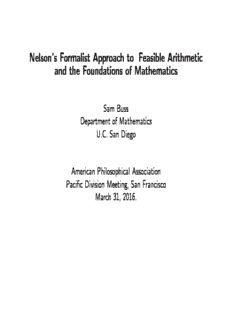
Nelson's Formalist Approach to Feasible Arithmetic and the Foundations of Mathematics PDF
Preview Nelson's Formalist Approach to Feasible Arithmetic and the Foundations of Mathematics
Nelson’s Formalist Approach to Feasible Arithmetic and the Foundations of Mathematics Sam Buss Department of Mathematics U.C. San Diego American Philosophical Association Pacific Division Meeting, San Francisco March 31, 2016. Nelson’s formalist philosophy: A radical form of constructivism Platonists believe in the full, independent existence our usual mathematical constructs, including integers, reals, the powerset of the reals, even abstract sets. Most constructivists, in the spirit of D. Hilbert, accept use of the completed infinity of integers, the use of primitive recursive functions, etc. Ed Nelson adopted a strict formalist philosophy, coupled with an ultra- constructivism that does not accept the totality of exponentiation and other primitive recursive functions. 1 I. Doubt About the Integers? How could one doubt the integers? Even without believing in the integers as “physical” entities, one surely should believe in them as a set of mental constructs that have definite properties. For example: Do there exist odd perfect integers? Whether there exists an odd perfect integer should be a definite property of the integers. That is, they exist, or do not exist, independently of the successes or failures human efforts in doing mathematics. In contrast, reasonable people might agree to doubt the relevance or the meaning of the continuum hypotheses CH or GCH. There could be multiple, equally compelling concepts of “set” and thus no reason to believe that CH or GCH have any independent meaning as a platonic truth (or platonic falsity). 2 On Doubting the Integers Nelson [PA, p.1]: The reason for mistrusting the induction principle is that it involves an impredicative concept of number. It is not correct to argue that induction only involves the numbers from 0 to n; the property of n being established may be a formula with bound variables that are thought of as ranging over all numbers. That is, the induction principle assumes that the natural number system is given. A number is conceived to be an object satisfying every inductive formula; for a particular inductive formula, therefore, the bound variables are conceived to range over objects satisfying every inductive formula, including the one in question. (emphasis added) 3 Nelson [A, p232]: If we attempt to justify induction from below, saying that a number is one of 0, S0, SS0, SSS0, and so forth, we make the category error of conflating the genetic with the formal. If we attempt to justify induction from above, saying that numbers by definition satisfy every inductive formula, then we are using an impredicate concept of number. 4 Nelson [Confessions, p.3]: Everything in creation is contingent; every created thing is dependent on the will of the Creator for its being. If numbers are uncreated, they are divine — this we reject. If numbers are created, they are contingent — this we find absurd. What other possibility is there? Simply that numbers do not exist — not until human beings make them. 5 Nelson [M&F, p.7]: I must relate how I lost my faith in Pythagorean numbers. One morning at the 1976 Summer Meeting of the American Mathematical Society in Toronto, I woke early. As I lay meditating about numbers, I felt the momentary overwhelming presence of one who convicted me of arrogance for my belief in the real existence of an infinite world of numbers, leaving me like an infant in my crib reduced to counting on my fingers. Now I live in a world in which there are no numbers save those that human beings on occasion construct. 6 II. Formalism Nelson [Confessions, pp.6-7]: Formalism denies the relevance of truth to mathematics. [...] In mathematics, reality lies in the symbolic expressions themselves, not in any abstract entity they are thought to denote. [...] What is real in mathematics is the notation, not an imagined denotation. 7 Ed, however, also had doubts about the unrestrained use of formalism. As he realized, a formalist deals with symbolic expressions. Symbolic expressions can code integers, and can be coded by integers (Go¨del coding). Thus an unrestrained use of formalism is tantamount to accepting the set of integers as a completed infinity. Both strands of thought came together in Ed Nelson’s mathematical development of predicative theories of arithmetic. 8 III. Nelson’s Predicative Arithmetic Hilbert’s program: Hilbert suggested that as a first step before considering “truth” or “semantics”, one should consider “syntax” of proofs and the “consistency” of theories. Hilbert’s program for establishing consistency was foiled by G¨odel’s incompleteness theorems already at the level of formal theories of arithmetic. Nelson took this failure at face value and doubted even the consistency of commonly used theories of the integers! Welcome fact: Even if one does not buy into formalism or ultra- constructivism, there is still interesting mathematics to do with weak systems of consistency strength much weaker than Peano arithmetic. Predicative arithmetic: a weak form of arithmetic which does not make platonic assumptions about the existence of a completed infinity of integers. 9
Description: